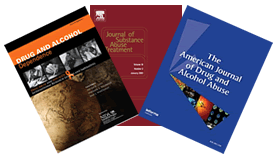New Data on Youth Substance Use and Drug-Related ED Visits |
|
|
Monitoring the Future Survey Results 2022
 Results are now available from the 2022 Monitoring the Future (MTF) survey of substance use behaviors and related attitudes among teens in the United States. Results are now available from the 2022 Monitoring the Future (MTF) survey of substance use behaviors and related attitudes among teens in the United States.
31,438 students (grades 8, 10, 12) from 308 schools across the United States participated in the 2022 survey.
The survey found that the dramatic decrease in drug use among teens from 2020-2021, thought to be influenced by the ongoing COVID-19 pandemic, held steady in 2022 despite many teens resuming social activities and in-person education.
Find a summary of the results, read the full report, or learn more about MTF.
DAWN Report on Drug-Related ED Visits in 2021
SAMHSA has released a new report (December 2022) which analyzes national data from the Drug Abuse Warning Network (DAWN) on drug-related emergency department visits in 2021. DAWN is a nationwide public health surveillance system that captures information on ED visits related to recent substance use and misuse directly from the electronic health records of participating hospitals. In 2021, the DAWN identified 149,021 (unweighted) drug-related ED visits from 52 participating hospitals. The report includes:
- Weighted estimates, including percent and unadjusted rates per 100,000
- Weighted estimates for the top five drugs in drug-related ED visits
- Monthly trends and drugs involved in polysubstance ED visits
- New drugs in DAWN’s Drug Reference Vocabulary
Download the report here.
|
CTN Trial Progress
 Randomizations for Active Studies as of the January 16 Trial Progress Report. Randomizations for Active Studies as of the January 16 Trial Progress Report.
CTN-0080 - Enrolled 120
CTN-0097 - Enrolled 415
CTN-0098 - Enrolled 111
CTN-0099 - Enrolled 1329
CTN-0099-A-1 - Enrolled 95
CTN-0100
Discontinuation - Enrolled 109
Retention - Enrolled 645
CTN-0101 - Enrolled 190
CTN-0107 - Enrolled 103
CTN-0108 - Enrolled 73
|
· · · · · · · · · · · · · · · · · · · · · · · · · · · · · · · · · · · · · · · ·
· · · · · · · · · · · · · · · · · · · · · · ·
Upcoming Webinars
 CTN Greater Southern CA Node: Opioid Use in Rural Communities: A 4-Part Series Addressing Implementation of Medication Treatment for Opioid Use Disorder in Clinical Settings CTN Greater Southern CA Node: Opioid Use in Rural Communities: A 4-Part Series Addressing Implementation of Medication Treatment for Opioid Use Disorder in Clinical Settings
The dramatic increase in opioid overdose deaths across the nation, particular in rural areas, highlights the need for rapid expansion of access to medication treatment for opioid use disorder (MOUD). The Greater Southern California Node and the Pacific Southwest ATTC is sponsoring a 4-part series featuring rural clinicians and clinical researchers sharing practical knowledge and skills for improving care for patients with OUD in rural settings.
Part 3: Caring for Complex Patients in Resource-Limited Communities
January 18, 2023, 12-1pm PST
Part 4: The Substance Use Disorder Workforce
February 15, 2023, 12-1pm PST
Learn more and register for the final two sessions here!
 CTN Northeast Node Science Series: Treating Stimulant Use Disorders in the Context of the Opioid Crisis: A Review (CTN Northeast Node) CTN Northeast Node Science Series: Treating Stimulant Use Disorders in the Context of the Opioid Crisis: A Review (CTN Northeast Node)
February 9, 2023
| 12-1pm EST
Presented by Craig R. Rush, PhD, of the University of Kentucky, this session will focus on current behavioral interventions used to treat stimulant use disorders, as well as promising pharmacological adjuncts. The efficacy of these interventions in the context of the ongoing opioid crisis will be emphasized. To register, contact Northeast.Node.CTN@Dartmouth.edu.
 Of Interest: Harnessing Your Expertise: How the Addiction Workforce Can Work with the Media to Improve Reporting on Addiction (Northwest ATTC) Of Interest: Harnessing Your Expertise: How the Addiction Workforce Can Work with the Media to Improve Reporting on Addiction (Northwest ATTC)
February 25, 2023 | 12-1pm PT
Mainstream media perpetuates many problematic narratives about drug use and addiction that increase stigma, discrimination, and bad policy. One way to address these shortcomings is to increase the coverage of evidence-based approaches to addiction treatment and recovery. To do this, we need bridges between subject matter experts and the media. However, many experts are not trained to interact with journalists in today’s media environment. This workshop is designed to offer customized training to support interactions between the addiction workforce and the media. Topics covered will include preparing for interviews and how to pitch ideas/op-eds to the media.
Presented by Ashton Marra and Jonathan Stoltman, co-directors of Reporting on Addiction, this informative session will teach you how to identify and reduce stigma in media coverage and provide helpful, tangible tips you can use to improve your interactions with the media and own writing on this important topic. Register here.
· · · · · · · · · · · · · · · · · · · · · · · · · · · · · · · · · · · · · · · ·
· · · · · · · · · · · · · · · · · · · · · · ·
News from the Western States Node
 The APA Monitor (American Psychological Association) monthly newspaper recently featured this blurb: The APA Monitor (American Psychological Association) monthly newspaper recently featured this blurb:
“Keith Humphreys, PhD, Stanford University professor of psychiatry and behavioral sciences, was named an Honorary Officer of the Order of the British Empire in September 2022 by the late Queen Elizabeth II. Dr. Humphreys received the honor for his work on addiction prevention policy in the United Kingdom, particularly for helping to enact mandatory abstinence programs to treat those arrested for alcohol-related crimes. He also helped the British Parliament start a sobriety program that focuses on keeping offenders sober."
For more about Dr. Humphreys' work and this honor from the Queen, check out this piece on the Stanford Med website.
Congratulations, Dr. Humphreys, and thank you for all your incredible contributions to our field!
New from the ATTC Network
 ATTC Network Turns 30. Join Us As We Celebrate by Greg Grisolano (ATTC Network). ATTC Messenger, January 2023. ATTC Network Turns 30. Join Us As We Celebrate by Greg Grisolano (ATTC Network). ATTC Messenger, January 2023.
Addiction Science Made Easy
This monthly column in the ATTC Messenger, written by CTN Dissemination Librarian Meg Brunner, MLIS, profiles one article from the CTN and a second article relevant to the addiction workforce (typically focused on SAMHSA research or DEI-related work).
Embracing Change: A System Framework by Maureen Nichols, South Southwest ATTC Director. ATTC/NIATx Service Improvement Blog. |
News from the Northeast Node
 Northeast Node Science Series kicks off its ’22-23 Academic Year with an in-depth review of cannabis as a potential pharmacological adjunct to MOUD Northeast Node Science Series kicks off its ’22-23 Academic Year with an in-depth review of cannabis as a potential pharmacological adjunct to MOUD
In November 2022, the Northeast Node welcomed Dr. Ziva Cooper of the UCLA Center for Cannabis & Cannabinoids to kick off the Node’s ’22-23 Academic Year Science Series. Dr. Cooper’s presentation, “Cannabis and Opioids: Promising pharmacology to address the opioid epidemic?” gave a brief overview of cannabis and the pharmacology of phytocannabinoids. Preclinical studies and randomized controlled trials have examined the potential for cannabinoids to modulate opioid effects and withdrawal symptoms, opioid abuse liability, and opioid analgesia. Dr. Cooper reviewed basic cannabinoid pharmacology and the state of evidence supporting the utility of cannabinoids for opioid use disorder and as an adjunct to opioids for pain management. The recorded presentation is available to all on the Northeast Node’s website.
On Thursday, February 9, 2023 (12-1pm ET), the Science Series will welcome Craig R. Rush, PhD, from the University of Kentucky as he presents "Treating Stimulant Use Disorders in the Context of the Opioid Crisis: A Review."
Please email Northeast.Node.CTN@Dartmouth.edu to join the Science Series or Northeast Node mailing lists to stay in the know about the Science Series.
|
· · · · · · · · · · · · · · · · · · · · · · · · · · · · · · · · · · · · · · · ·
· · · · · · · · · · · · · · · · · · · · · · ·
New in the CTN Dissemination Library
 Homelessness and Treatment Outcomes Among Black Adults with Opioid Use Disorder: A Secondary Analysis of X:BOT. Justen M, et al. Journal of Addiction Medicine 2023 (in press). (CTN-0051) Homelessness and Treatment Outcomes Among Black Adults with Opioid Use Disorder: A Secondary Analysis of X:BOT. Justen M, et al. Journal of Addiction Medicine 2023 (in press). (CTN-0051)
Baseline Representativeness of Patients in Clinics Enrolled in the PRimary care Opioid Use Disorders treatment (PROUD) Trial: Comparison of Trial and Non-Trial Clinics in the Same Health Systems. Wartko PD, et al. BMC Health Services Research 2022;22:1593. (CTN-0074)
Differential Effects of Patient Navigation Across Latent Profiles of Barriers to Care Among People Living with HIV and Comorbid Conditions. Traynor SM, et al. Journal of Clinical Medicine 2023;12:114. (CTN-0049)
· · · · · · · · · · · · · · · · · · · · · · · · · · · · · · · · · · · · · · · ·
· · · · · · · · · · · · · · · · · · · · · · ·
New from NIDA
News Release: Endocarditis in patients with opioid use disorder markedly increased between 2011 and 2022
The incidence rate of infective endocarditis, a rare but often fatal inflammation of the heart valves, among patients with cocaine or opioid use disorder increased between 2011 and 2022, with the steepest increases during 2021-2022.
Study findings contribute to expanding evidence of endocarditis as a significant and rowing health concern for people who inject drugs, and further demonstrate that this risk has been exacerbated during the COVID-19 pandemic.
Read more from the NIDA press release here. |
Upcoming NIDA Events
NIDA HIV Seminar Series: Outside In and Inside Out: Neuroimmune Mechanisms Linking Stimulant Use and HIV
January 25, 2023 | 1-2pm ET
Presenter Adam Carrico, PhD (University of Miami) will present information on the bi-directional neuroimmune pathways linking co-occurring stimulant use and HIV.
Health Economics at NIMH and NIDA: Domestic and International
January 25, 2023 | 11am-5pm ET
This virtual session will showcase research in the areas of payment and financing, behavioral economics, and social determinants of health in both US domestic and international research.
|
   
|